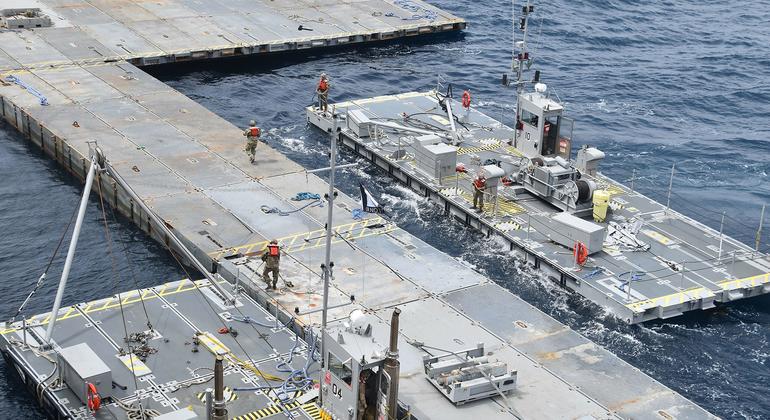Adopting a resolution with the same title, the Assembly also asked the Secretary-General to establish an outreach programme on the Srebrenica genocide in preparation for the 30th anniversary next year.
It further condemned any denial of the Srebrenica genocide as a historical event and called on Member States to preserve the established facts, including through their educational systems, towards preventing denial and distortion, and any occurrence of genocide in the future.
The text, sponsored by Germany and Rwanda, was adopted by a recorded vote of 84 nations in favour, 19 against and 68 abstentions.
The massacre in Srebrenica
The massacre in Srebrenica marked one of the darkest chapters of the war that erupted after the breakup of former Yugoslavia.
In July 1995, the Bosnian Serb army overran Srebrenica, which was previously declared a safe area by the Security Council, and brutally murdered thousands of men and teenagers there, and expelled 20,000 people from the town.
A small and lightly armed unit of Dutch peacekeepers under the UN flag were unable to resist the Bosnian Serb force.
The brutal killings of Bosnian Muslims in Srebrenica by the army of Republika Srpska was recognized as an act of genocide by the International Court of Justice (ICJ) as well as the International Criminal Tribunal for the former Yugoslavia (ICTY).
Firmly against denial
Volker Türk, UN High Commissioner for Human Rights, welcomed the resolution as “further recognition” of the victims and survivors, and their pursuit of justice, truth and guarantees of non-recurrence.
“The resolution is all the more important given the persistent revisionism, denial of the Srebrenica genocide and hate speech by high-level political leaders in Bosnia and Herzegovina, as well as in neighbouring countries,” he said in a statement.
He also underscored the responsibility of political leaders in the region to engage in constructive dialogue to build peaceful societies “where people can live safely and freely, without discrimination or fear of conflict and violence”.
Germany: To honour victims
Introducing the draft resolution, Antje Leendertse, Ambassador and Permanent Representative of Germany to the UN, said that the initiative was about honouring the victims and supporting survivors, “who continue to live with scars of that fateful time”.
The text is modelled on the General Assembly resolution that designated 7 April as the International Day of Reflection on the 1994 Genocide against the Tutsi in Rwanda.
“It also underscores the role of international courts in fighting impunity and ensuring accountability for genocide, and contains language against genocide denial and glorification of perpetrators,” she added.
She also spoke against “false allegations”, stating that the resolution “is not directed against anybody”.
“Not against Serbia, a valued member of this Organization. If at all, it is directed against perpetrators of the genocide,” Ambassador Leendertse added.
“I therefore invite everybody to judge the text on its merits and to support our call to commemorate and reflect on what happened in Srebrenica almost thirty years ago.”
Serbia: A Pandora’s box

Serbian President Aleksandar Vučić labelled the text “highly politicized” saying it would “open a Pandora’s box”.
The draft resolution “was hidden” by its authors, he said, adding that it lacked an inclusive process compared with “the resolution for Rwanda”, which was prepared in a “very transparent way”.
He recalled discussions over the issue at the Security Council in March.
“When we wanted to discuss the bombing of Serbia in 1999, they said to us ‘don’t look at the past, look at the future – it happened 25 years ago’. Two days after that, we found out that they were preparing this kind of resolution relating to events even four years prior to [1999],” he said.
“When they have some needs – political needs, they can go deep into the past. When someone else is referring to the past, in that case the facts – they don’t matter.”
With verdicts and convictions already delivered through the judicial process, the resolution would now only deepen divisions and lead to instability, President Vučić added.
“This is not about reconciliation, not about memories, this is something that will just open an old wound and create complete political havoc. Not only in our region, but even here, in this hall”, he argued.





